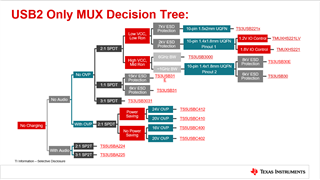Other Parts Discussed in Thread: TS3USB30E, TS3USB3000, , ,
I want to implement a USB2.0 multiplexer (mux) into my system, and have certain requirements for the functionality of the mux. What choice would be best for my system?
This thread has been locked.
If you have a related question, please click the "Ask a related question" button in the top right corner. The newly created question will be automatically linked to this question.
I want to implement a USB2.0 multiplexer (mux) into my system, and have certain requirements for the functionality of the mux. What choice would be best for my system?
TI has a large variety of 2-channel USB2.0 passive muxes, most coming with a feature or functionality that appeals to a certain use case. Depending on what your use case is, there is likely a USB2.0 mux that supports it.
For starters, if you are looking for a mux that has both USB2.0 and USB3.0 switching capabilities, you can look at the HD3SS6126, a 2:1 differential switch that supports both USB2 DP/DM lanes and USB3 TX/RX lanes at the same time.
If you are looking for a USB2.0 switch with BC 1.2 detection, you can use the BQ24392, a single-pole single-throw (SPST) switch that commonly used in mobile-phones for charge detection.
If you are looking for a USB2.0 mux with analog audio capabilities and switching, you can look at the TS3USBA224 (2:1) or the TS3USBA225 (3:1), which both come with the ability for audio signals to swing below ground as needed.
For muxes with over-voltage protection (OVP), we have four choices. The TS5USBC412 (24v OVP) and the TS5USBC410 (20v OVP) come with power-saving functionality, while the TS5USBC400 (16v OVP) and the TS5USBC402 (20v OVP) do not come with power-saving functionality.
Next, we have a variety of typical use-case muxes. The TS3USB3031 is a 3:1 SPDT (single-pole dual-throw) mux that supports Mobile High-Definition Link (MHL) on one of its lanes, however, this lane can also be used for USB2 signals. The TS3USB30/TS3USB30E/TS3USB3000 are 2:1 SPDT muxes that support a higher VCC (Up to 4.3V) at the cost of a higher RON, with the TS3USB3000 supporting a higher bandwidth than the two alternatives, and the TS3USB30E coming with ESD protection. There is also a set of 1:1 SPDT muxes, the TS3USB31 and the TS3USB31E, with the latter coming with ESD protection.
Finally, we have a family of low VCC, low Ron muxes as well. The TS3USB221/TS3USB221A/TS3USB221E are all 2:1 SPDT muxes, with the main difference between each iteration being the amount of ESD protection, with the TS3USB221A having 7KV of ESD protection (HBM) and the TS3USB221E having 12KV of ESD protection (HBM). The TMUXHS221/TMUXHS221LV are also 2:1 SPDT muxes similar to the TS3USB221/A/E, with the main differences being a different package, and the TSMUXHS221LV being a low-voltage option, with the ability to be controlled with 1.2V I/O.
